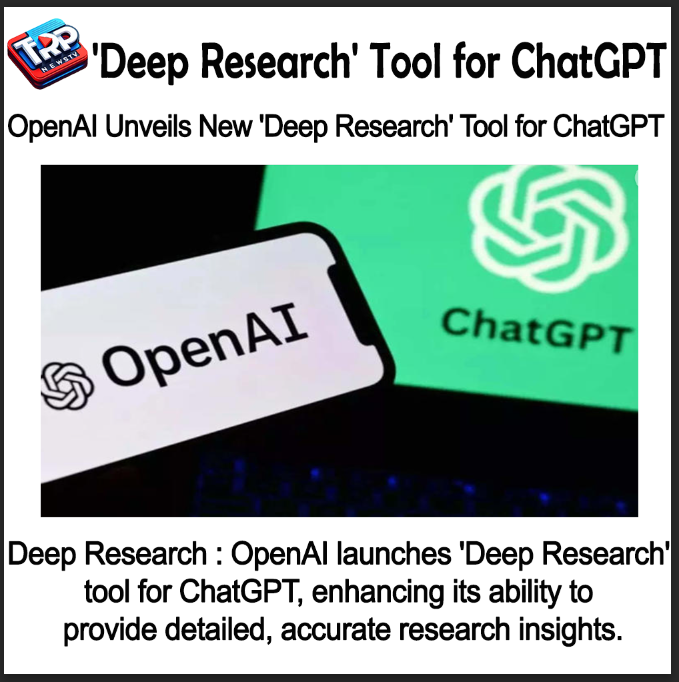
OpenAI Unveils New ‘Deep Research’ Tool for ChatGPT
OpenAI has recently introduced “Deep Research,” a cutting-edge AI feature designed to enhance the research capabilities of ChatGPT. This tool aims to assist professionals in fields such as finance, science, policy, and engineering by conducting autonomous, multi-step research tasks over the internet. With the ability to analyze and compile information from various sources, Deep Research represents a significant leap forward in AI-driven data synthesis and reporting.
Key Features of Deep Research
1. Autonomous Multi-Step Research
One of the most groundbreaking aspects of Deep Research is its ability to conduct multi-step investigations autonomously. Users can submit complex queries along with supporting documents, such as PDFs, spreadsheets, or images, and the tool will execute a structured research plan. This allows ChatGPT to deliver in-depth responses within a timeframe of 5 to 30 minutes, significantly reducing the time required for human researchers to gather and synthesize similar information.
2. Advanced Data Analysis
Deep Research leverages OpenAI’s upcoming “o3” model, which enhances the AI’s ability to browse the web, analyze documents, and extract relevant insights. This enables the tool to generate detailed research reports that mirror the quality and depth of those produced by professional analysts. Unlike standard AI-generated responses, Deep Research can evaluate multiple sources, ensuring more accurate and nuanced results.
3. Comprehensive and Cited Reporting
A major challenge with AI-generated content is the credibility and reliability of the information. OpenAI has addressed this by ensuring that Deep Research provides citations for its sources. Users receive well-structured reports with references, helping them verify the accuracy of the data and build trust in AI-driven research outputs.
4. Integration with Various Formats
Professionals often work with a diverse range of file formats, from spreadsheets to complex data tables and text-heavy documents. Deep Research supports multiple input formats, allowing users to provide supplementary materials for context. This integration enhances the AI’s ability to extract, interpret, and present relevant insights effectively.
Accessibility and Pricing
Initially, Deep Research is available on the web version of ChatGPT, with plans for expansion to mobile and desktop applications later in the year. The feature is primarily targeted at Pro users, who will have access to 100 queries per month for a subscription fee of $200 per month. Additionally, OpenAI is considering offering limited access to non-Pro users, with a faster version of the tool planned for future iterations.
Potential Applications
1. Academic and Scientific Research
Academics and scientists can leverage Deep Research to quickly analyze existing literature, summarize key findings, and identify trends within a specific domain. This tool can significantly enhance research efficiency by reducing the time spent on data collection and analysis.
2. Business and Market Analysis
Business professionals, including market analysts and consultants, can use Deep Research to stay updated on industry trends, competitors, and financial reports. The AI’s ability to sift through vast amounts of information enables businesses to make data-driven decisions with greater confidence.
3. Legal and Policy Research
Lawyers and policy makers can utilize Deep Research to analyze legal precedents, policy documents, and regulatory frameworks. The AI’s citation feature ensures that all references are verifiable, helping professionals base their conclusions on accurate legal texts and policy statements.
4. Journalism and Investigative Reporting
Journalists and media professionals can benefit from Deep Research by gathering background information, fact-checking claims, and summarizing key events. The AI’s ability to compile detailed reports from multiple sources makes it a valuable tool for investigative journalism.
Challenges and Limitations
Despite its promising capabilities, Deep Research is still in its early stages and faces several challenges:
- Accuracy and Reliability: While the tool aims to provide credible research, it may still generate inaccuracies or misinterpret information. Users must verify sources and critically evaluate AI-generated insights.
- Bias in Data Selection: AI models are only as good as the data they access. If the sources the AI retrieves contain biases, the generated reports may reflect those biases.
- Formatting and Citation Errors: Users have reported occasional inconsistencies in how sources are cited, which may require manual correction.
OpenAI acknowledges these challenges and is actively working to refine the tool’s accuracy and reliability over time.
Future Prospects
The launch of Deep Research follows OpenAI’s recent introduction of “Operator,” an AI-powered task automation tool designed to assist users in planning and organizing tasks. The combination of these two tools signals OpenAI’s ambition to create a more comprehensive AI ecosystem capable of handling complex, real-world applications.
In the future, OpenAI plans to enhance Deep Research with:
- Faster Response Times: Optimizations in the AI’s processing speed to deliver quicker research reports.
- Expanded Access: Wider availability for non-Pro users at different pricing tiers.
- Enhanced AI Reasoning: Improvements in how AI interprets and synthesizes complex information to provide more precise answers.
Conclusion
OpenAI’s Deep Research tool represents a significant advancement in AI-powered research capabilities. By autonomously conducting multi-step investigations, analyzing vast datasets, and providing well-structured reports with citations, this tool has the potential to revolutionize how professionals conduct research across various industries. While it still faces challenges, ongoing refinements and updates promise to make it an indispensable asset for researchers, businesses, journalists, and policymakers alike.
As AI continues to evolve, tools like Deep Research will play a crucial role in shaping the future of knowledge discovery, making high-quality research more accessible and efficient for users worldwide.





